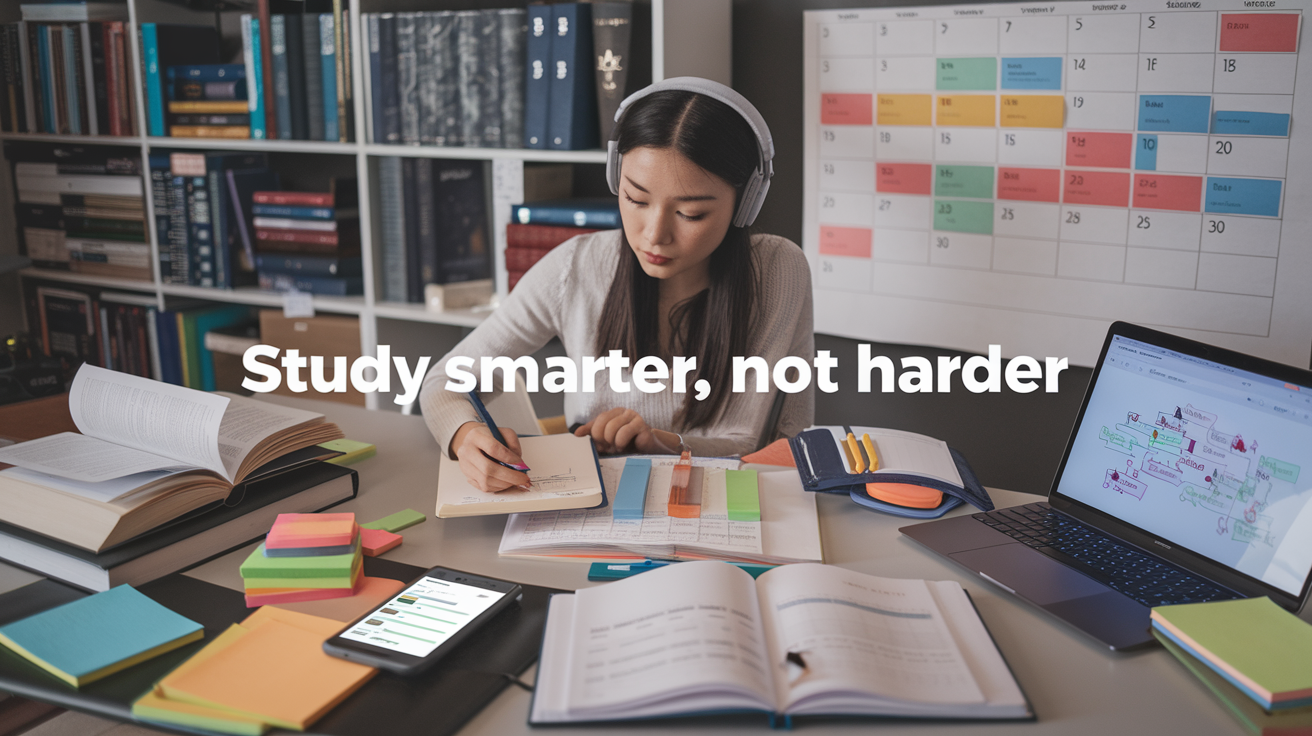
Are you drowning in a sea of legal textbooks, case studies, and statutes? 📚⚖️ As a law student, you’re no stranger to late nights, caffeine-fueled study sessions, and the constant pressure to excel. But what if there was a better way to tackle your mountain of coursework?
Imagine being able to absorb complex legal concepts faster, retain information longer, and still have time for a social life. 🎉 It’s not just a dream – it’s possible with the right study techniques. In this blog post, we’ll explore eight game-changing strategies that will revolutionize your approach to law school. From understanding your unique learning style to maintaining your mental well-being, we’ve got you covered.
Get ready to transform your study habits and unlock your full potential as a law student. Let’s dive into the world of efficient study methods that will help you study smarter, not harder. 🚀
Understand Your Learning Style

Visual, Auditory, or Kinesthetic
Understanding your learning style is crucial for efficient studying. The three primary learning styles are:
- Visual
- Auditory
- Kinesthetic
Each style has unique characteristics and optimal study methods:
| Learning Style | Characteristics | Effective Study Methods |
|---|---|---|
| Visual | Prefer images, charts, and visual aids | Mind maps, diagrams, color-coding |
| Auditory | Learn best through listening and discussion | Podcasts, group discussions, recorded lectures |
| Kinesthetic | Learn by doing and hands-on experiences | Role-playing, case studies, moot courts |
Adapt Study Methods to Your Style
Once you’ve identified your learning style, tailor your study techniques accordingly:
- Visual learners: Create colorful mind maps for complex legal concepts
- Auditory learners: Record yourself summarizing cases and listen during commutes
- Kinesthetic learners: Use flashcards for active recall and movement
Maximize Retention with Personalized Techniques
Enhance your learning by combining methods that suit your style:
- Visual + Kinesthetic: Create legal timelines and physically arrange case cards
- Auditory + Visual: Listen to lectures while following along with visual aids
- Kinesthetic + Auditory: Act out legal scenarios while explaining concepts aloud
By aligning your study methods with your learning style, you’ll improve comprehension and retention of complex legal material. Next, we’ll explore how to master active reading techniques, a crucial skill for any law student.
Master Active Reading Techniques

SQ3R Method: Survey, Question, Read, Recite, Review
The SQ3R method is a powerful active reading technique that can significantly enhance your comprehension and retention of legal texts. Here’s how to apply it:
- Survey: Quickly skim the material to get an overview
- Question: Formulate questions based on headings and key points
- Read: Carefully read the text, seeking answers to your questions
- Recite: Summarize the main points in your own words
- Review: Go back over the material to reinforce understanding
| Step | Purpose | Action |
|---|---|---|
| Survey | Get an overview | Skim headings, subheadings, and summaries |
| Question | Engage with the material | Create questions based on the content |
| Read | Comprehend deeply | Read actively, seeking answers |
| Recite | Reinforce learning | Summarize key points aloud or in writing |
| Review | Solidify understanding | Revisit the material and your notes |
Case Briefing Strategies
Mastering case briefing is crucial for law students. Use this structured approach:
- Facts: Summarize the key events and parties involved
- Issue: Identify the legal question at hand
- Rule: State the relevant law or legal principle
- Analysis: Explain how the rule applies to the facts
- Conclusion: Summarize the court’s decision and reasoning
Effective Note-Taking for Legal Texts
Develop a systematic approach to note-taking:
- Use the Cornell method: Divide your page into sections for notes, cues, and summary
- Employ legal abbreviations and symbols to increase efficiency
- Focus on key concepts, rules, and case examples
- Regularly review and consolidate your notes
Mind Mapping for Complex Legal Concepts
Mind mapping is an excellent tool for visualizing intricate legal relationships:
- Start with the central concept in the middle
- Branch out with related ideas and subtopics
- Use colors and symbols to enhance visual memory
- Connect related concepts with lines or arrows
This technique helps you see the big picture and understand how different legal principles interconnect. With these active reading techniques, you’ll be better equipped to tackle complex legal materials efficiently.
Optimize Your Study Environment

Create a Distraction-Free Zone
To optimize your study environment, start by creating a distraction-free zone. This dedicated space will help you focus and maximize your productivity. Consider the following tips:
- Choose a quiet location away from high-traffic areas
- Use noise-canceling headphones or white noise machines
- Keep your phone on silent and out of sight
- Install website blockers to limit social media access
Organize Study Materials Efficiently
An organized study space is crucial for efficient learning. Implement these strategies:
- Use color-coded folders for different subjects
- Maintain a digital filing system for easy access to notes
- Create a study schedule and display it prominently
- Keep frequently used resources within arm’s reach
| Organization Method | Benefits |
|---|---|
| Physical filing system | Easy access to hard copies |
| Digital organization | Quick search and retrieval |
| Task management apps | Improved time management |
| Whiteboard planning | Visual representation of goals |
Incorporate Ergonomic Principles
Ergonomics play a vital role in maintaining comfort and focus during long study sessions. Consider these ergonomic adjustments:
- Invest in a comfortable, adjustable chair
- Position your computer screen at eye level
- Use a standing desk for variety in posture
- Ensure proper lighting to reduce eye strain
By optimizing your study environment, you’ll create a space that enhances focus, reduces distractions, and promotes efficient learning. Next, we’ll explore how to utilize time management tools to further boost your productivity.
Utilize Time Management Tools

Pomodoro Technique for Focused Study Sessions
The Pomodoro Technique is a powerful time management method that can significantly boost your productivity. Here’s how it works:
- Choose a task
- Set a timer for 25 minutes
- Work on the task until the timer rings
- Take a short 5-minute break
- Repeat steps 1-4 four times
- After the fourth cycle, take a longer 15-30 minute break
This technique helps maintain focus and prevents burnout. Many law students find it particularly effective for tackling complex legal texts or case studies.
Block Scheduling for Balanced Workload
Block scheduling involves dividing your day into dedicated time blocks for specific tasks. This method can help you:
- Allocate sufficient time for each subject
- Reduce context switching
- Maintain a balanced study routine
| Time | Monday | Tuesday | Wednesday | Thursday | Friday |
|---|---|---|---|---|---|
| 9-11 | Contracts | Torts | Criminal Law | Property | Constitutional Law |
| 11-1 | Legal Writing | Research | Moot Court | Ethics | Elective |
| 2-4 | Study Group | Case Briefs | Mock Trial | Internship | Review |
Digital Apps for Task Prioritization
Leverage technology to streamline your task management:
- Trello: Organize tasks into boards, lists, and cards
- Todoist: Create to-do lists with priority levels and due dates
- Forest: Gamify your focus time and reduce phone distractions
Set Realistic Goals and Deadlines
Setting achievable goals is crucial for maintaining motivation and progress. Use the SMART criteria:
- Specific: Clearly define what you want to accomplish
- Measurable: Quantify your progress
- Achievable: Ensure the goal is realistic
- Relevant: Align with your overall study objectives
- Time-bound: Set a deadline for completion
By implementing these time management tools, you’ll be better equipped to handle the rigorous demands of law school. Next, we’ll explore effective memorization techniques to help you retain all that valuable information you’re studying.
Leverage Technology for Efficient Learning

Legal Research Databases and Tools
In the digital age, law students have access to powerful legal research databases and tools that can significantly enhance their study efficiency. Here are some essential resources:
- Westlaw and LexisNexis: These industry-standard platforms provide comprehensive access to case law, statutes, and legal analysis.
- Google Scholar: A free alternative for finding court opinions and academic articles.
- Casetext: Offers AI-powered legal research tools to streamline the research process.
| Database | Key Features | Best For |
|---|---|---|
| Westlaw | Comprehensive legal content, KeyCite | In-depth research |
| LexisNexis | Shepard’s Citations, news sources | Broad legal analysis |
| Google Scholar | Free access, user-friendly | Quick case lookups |
| Casetext | AI-powered search, CARA A.I. | Efficient research |
Flashcard Apps for Memorization
Flashcard apps are invaluable for memorizing legal terms, case details, and statutes. Popular options include:
- Anki: Customizable spaced repetition system
- Quizlet: User-friendly interface with various study modes
- Brainscape: Adaptive learning algorithm for efficient memorization
Online Study Groups and Forums
Collaborative learning can enhance understanding and retention. Utilize:
- Reddit’s r/LawSchool: Engage in discussions and share resources
- Discord servers: Join law school-specific channels for real-time collaboration
- Zoom study groups: Organize virtual study sessions with classmates
Exam Prep Software
Prepare for exams effectively with specialized software:
- ExamSoft: Simulates exam conditions and provides analytics
- BARBRI: Offers comprehensive bar exam preparation materials
- Themis: Provides adaptive learning technology for bar exam study
By leveraging these technological tools, law students can streamline their study process, enhance retention, and improve overall academic performance. Next, we’ll explore effective memorization techniques to complement these digital resources.
Implement Effective Memorization Techniques

Spaced Repetition for Long-Term Retention
Spaced repetition is a powerful technique that leverages the psychological spacing effect to enhance long-term memory retention. For law students, this method is particularly effective for memorizing complex legal concepts and case law.
| Time Interval | Review Frequency |
|---|---|
| Day 1 | 3 times |
| Day 2 | 2 times |
| Day 4 | 1 time |
| Day 7 | 1 time |
| Day 14 | 1 time |
| Day 30 | 1 time |
To implement spaced repetition:
- Create flashcards for key legal terms and concepts
- Review the cards according to the schedule above
- Adjust intervals based on your recall difficulty
Mnemonics for Legal Terms and Concepts
Mnemonics are memory aids that help you recall information through associations. For law students, creating memorable acronyms or phrases can significantly improve retention of legal principles.
Examples of legal mnemonics:
- IRAC: Issue, Rule, Application, Conclusion (for legal analysis)
- PEN: Property, Evidence, Negligence (for tort law elements)
- MIST: Mens rea, Intent, Strict liability, Transfer (for criminal law concepts)
Teaching Others to Reinforce Understanding
The “protégé effect” suggests that teaching others enhances one’s own understanding and retention of the material. As a law student, you can:
- Form study groups and take turns explaining concepts
- Create mini-lectures on complex topics
- Mentor junior students in specific areas of law
By implementing these techniques, you’ll not only memorize legal information more effectively but also develop a deeper understanding of the subject matter. This comprehensive approach to memorization will serve you well in your legal studies and future practice.
Develop Critical Thinking Skills

Practice IRAC (Issue, Rule, Analysis, Conclusion) Method
The IRAC method is a cornerstone of legal analysis and critical thinking. Here’s how to effectively implement it:
- Issue: Clearly identify the legal question at hand
- Rule: State the relevant law or legal principle
- Analysis: Apply the rule to the facts of the case
- Conclusion: Summarize your legal reasoning
Engage in Mock Debates and Discussions
Participating in mock debates enhances your ability to:
- Articulate complex legal arguments
- Think on your feet
- Anticipate counterarguments
- Develop persuasive speaking skills
| Activity | Benefits |
|---|---|
| Moot Court | Simulates real courtroom experience |
| Study Group Debates | Encourages diverse perspectives |
| Online Legal Forums | Exposes you to varied legal scenarios |
Analyze Real-World Legal Cases
Studying actual cases helps you:
- Apply theoretical knowledge to practical situations
- Understand judicial reasoning
- Identify key legal principles in action
Seek Feedback from Professors and Peers
Regular feedback is crucial for improving your critical thinking skills:
- Submit practice essays for review
- Participate in class discussions
- Join study groups for collaborative learning
- Attend office hours for one-on-one guidance
By consistently applying these techniques, you’ll sharpen your critical thinking skills, a vital asset for any aspiring lawyer. As you develop these abilities, you’ll find yourself better equipped to tackle complex legal problems and excel in your studies. Next, we’ll explore how maintaining your physical and mental well-being can further enhance your academic performance.
Maintain Physical and Mental Well-being

Regular Exercise for Cognitive Function
Regular exercise is crucial for law students to maintain peak cognitive function. Physical activity increases blood flow to the brain, promoting the growth of new neurons and enhancing overall brain performance. Here are some key benefits of exercise for law students:
- Improved memory retention
- Enhanced focus and concentration
- Reduced stress and anxiety
- Increased energy levels
- Better sleep quality
| Exercise Type | Benefits for Law Students |
|---|---|
| Aerobic | Boosts memory and learning |
| Strength | Improves focus and decision-making |
| Yoga | Reduces stress and enhances mindfulness |
Proper Nutrition for Brain Health
A well-balanced diet is essential for optimal brain function. Law students should focus on consuming nutrient-rich foods that support cognitive performance:
- Omega-3 fatty acids (found in fish, walnuts, and flaxseeds)
- Antioxidants (berries, dark chocolate, and leafy greens)
- Complex carbohydrates (whole grains, quinoa, and brown rice)
- Lean proteins (chicken, turkey, and legumes)
Stress Management Techniques
Law school can be incredibly stressful, making stress management crucial for maintaining mental well-being. Effective techniques include:
- Mindfulness meditation
- Deep breathing exercises
- Progressive muscle relaxation
- Regular breaks and leisure activities
Adequate Sleep for Memory Consolidation
Quality sleep is vital for memory consolidation and overall cognitive function. Law students should aim for 7-9 hours of sleep per night to:
- Enhance learning and retention
- Improve problem-solving skills
- Boost creativity and critical thinking
- Reduce stress and emotional reactivity
Establishing a consistent sleep schedule and creating a relaxing bedtime routine can significantly improve sleep quality and academic performance.

As a law student, embracing efficient study methods is crucial for academic success and future career prospects. By understanding your learning style, mastering active reading techniques, and optimizing your study environment, you can maximize your learning potential. Implementing time management tools, leveraging technology, and utilizing effective memorization techniques will further enhance your study efficiency. Additionally, developing critical thinking skills and maintaining your physical and mental well-being are essential components of a successful law school journey.
Remember, the key to excelling in law school is not just about studying harder, but studying smarter. By incorporating these strategies into your daily routine, you’ll be better equipped to handle the rigorous demands of legal education. Take the time to experiment with different methods and find what works best for you. With dedication and the right approach, you can achieve your academic goals and lay a strong foundation for your future legal career.
